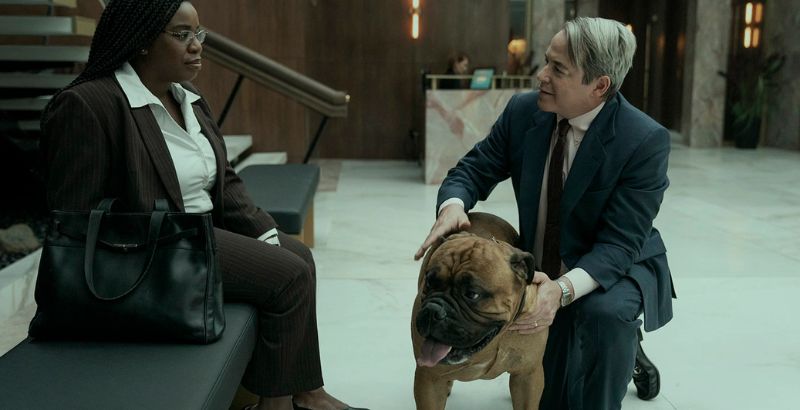
In the late 90s, pharmaceutical company Purdue Pharma released Oxycontin to the general public as a pain killer that was drastically less addictive than other similar drugs on the market. Painkiller explores the business practices and policies that Purdue employed to make OxyContin one of the most prescribed medicines in the US, and how that came to fuel the opioid epidemic that came to ruin countless lives.
At the beginning of each episode, Painkiller goes out of its way to clarify that it is a drama based on real events. Stated by a different person in each episode, each of these people also states that what isn’t a dramatization is the pain that they have each endured due to the loss of a loved one to OxyContin. While some things have been altered for dramatic effect, the core of what is being presented is based on the horrible pain millions have had to endure.
Painkiller splits its narrative into three central parts. The core of the program follows how Richard Sackler (Mathew Broderick) managed the roll-out of Oxy, as well as how he attempted to keep it flowing on the streets. This aspect of the story is told in part by following Sackler through these phases of his life but is also told largely from the point of view of a District Attorney investigator named Edie Flowers (Uzo Aduba).
This portion of the series is how the show presents the larger legal aspects of its narrative. Flower’s outlook is presented after the fact, as she is interviewed about her experience pursuing Purdue Pharma. Aduba delivers Flowers’ frustration and anger over how Purdue managed to flaunt the law throughout her time investigating them. The actor captures the anger of the character extremely well. An early scene sees her demand that a seat that Sackler had used be removed from the room she is being interviewed in before she can continue. While this request feels farcical to type, the actor delivers her revulsion of anything that can be directly connected to Sackler with such simmering intensity that there is no humor at the moment when it is shown.
Sackler himself provides the most questionable element of Painkiller’s narrative. While Broderick does a convincing job playing the corrupt corporate executive who cares not one whit about who gets hurt by his product as long as the money continues to flow, I cannot help but wonder just how many liberties the series takes with the character. Frequently seen having conversations with an imaginary version of his grandfather who founded the company, Arthur Sackler (Clark Gregg), these elements feel like a bit too much dramatization for a series that is at the end of the day based in fact and telling a real story. While they deliver some strong character moments that Broderick manages to perform skillfully, it makes the series as a whole feel less factually based than the rest of the narrative presents itself as.
The second part of Painkiller’s narrative follows a new recruit to Purdue Pharma named Shannon Schaeffer (West Duchovny). It is through Schaeffer’s point of view that the film explores how Purdue pushed its product into doctors’ hands and onto the masses at large. With
bonuses linked to how many milligrams the doctors they visited prescribed to patients, Schaeffer and the other Purdue reps are encouraged to do whatever they have to in order to get doctors to prescribe as much OxyContin as possible. Having just fled from a dysfunctional family and no place else to go, Schaeffer is swept up in the possibilities of financial success, as well as the company’s promise that their product will help patients feel better.

Duchovny handles her character’s arc well. As she progresses from a naive newcomer to a concerned worker, and finally, whistleblowing on her bosses, the character never fails to feel relatable. Almost as much a victim trapped in the web as everyone else her part small part in the drug’s success is countered by her eventual attempt to make things right. It is also through her eyes that we see recruitment drives, business celebrations, and financial earnings conferences where the only message is to sell as much Oxy as you can. These meetings, frequently parties that involve employees snorting a fair amount of their company’s product, are terrifying when one considers they are talking about a product that is essentially heroin.
The final aspect of Painkiller’s narrative follows a small-time garage owner named Glen Kryger (Taylor Kitsch) as he suffers an accidental back injury at work and is prescribed OxyContin for his recovery. As the series progresses, Kryger goes through the various elements of addiction,
recovery, and relapse we have all heard about many times. Kitsch’s portrayal of the man’s struggles as the addictive need for the drug seeps into his unexpecting self, is done well. How he falls into it due to his natural trust in his doctor makes him seem all the more like a victim, as he was drawn into the situation through no fault of his own.
Furthermore, Painkiller does an excellent job of how it presents Kryger and his family in his worst moments. While it makes sure never to blame him, it also does a fantastic job of never shining an unduly harsh light on his family either. As he is pushed away from his wife and children, it always endeavors to show how they are being forced to take these actions for their own safety, highlighting how they too are victims of the drug’s destructive nature.
These three main branches of Painkiller’s narrative come together to cohesively construct a story that both explores the large-scale elements and effects of OxyContin on the public, as well as allows the story to not lose sight of the individual impact it had. It is a powerful and often disturbing look at capitalism run amok in one of the most dangerous fields for it to do so.
Painkiller is streaming now on Netflix.
Painkiller
-
Rating - 8/108/10
TL;DR
Painkiller is a powerful and often disturbing look at capitalism run amok in one of the most dangerous fields for it to do so.






